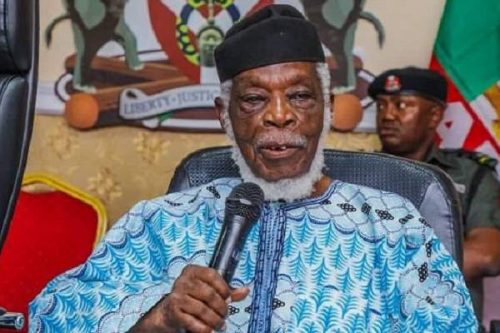What tendency will prevail in Yoruba politics in the aftermath of the death early this morning of elder statesman, Ayo Fasanmi? This angle to the death recommends itself given how age and death has reduced the ranks of the generation of original Awoists in that tendency sub-set in Nigerian politics. The late Chief Michael Ajasin, civilian governor of Ondo State was the team leader before his death in 1997. He earned his place as a teacher who had taught so many of the elite in that region as to be the late Chief Awolowo’s preferred governorship material for that state in the Second Republic. That was it but his struggle for Second term was briefly disrupted by his then deputy, Chief Akin Omoboriowo who rebuffed Chief Awolowo’s plea to let Chief Ajasin have two terms and decamped to the then National Party of Nigeria, (NPN). The violence that greeted Chief Omoboriowo’s “victory” in the 1983 General Elections was such that he had to be smuggled to as far as Maiduguri in Borno State because, as a witness put it, “every house belonging to the NPN in the area was on fire”.

The late Chief Michael Adekunle Ajasin
It was basically the same scenario in Oyo State where the NPN candidate, Chief Victor Olunloyo, was declared the winner in the contest between him and Chief Bola Ige of the Unity Party of Nigeria, (UPN). The only difference between the violence in Oyo State and Ondo State then is that General Muhammadu Jega, the then GOC of 2 Div of the Nigerian Army, with an obvious nudge from Headquarters, took control. Eventually, the Supreme Court returned power to Chief Ajasin. Subsequently, he emerged formal leader of the rump of Awoism.
Today, it seems Chief Ayo Adebanjo and Reuben Fasoranti are about the only ones of that generation left. Chief Lateef Jakande, the highly rated governor of old Lagos State is still alive but has not been that active in Afenifere politics, either of the Awo version or the Obasanjo version that emerged in the wake of Chief Olusegun Obasanjo’s ascendancy.
In that sense, what might be most significant about Ayo Fasanmi’s death may be the impending generational cum tendency shift in Yoruba politics and the question of how different it might be from the past. The question of a successor tendency is even more complicated to analyse. There is a successor tendency in view quite alright but the identity is still so fluid. There is, indeed, such a tendency united in one political party – the ruling All Progressives Congress, (APC) but it is not only fragmented but also faces a contender outside of it. While Bola Ahmed Tinubu is the leader of the APC coalition of Yoruba elite, he faces internal revolt of some sort by protégés who speak more to the Yoruba celebration of being learned. Dr. Kayode Fayemi who may be regarded as one of the ‘rebels’ is a PhD holder and a civil society actor in politics. Babatunde Fashola is, on the other hand, a technocrat’s technocrat, being a lawyer and having managed Tinubu’s bureaucracy as the Chief of Staff before being promoted to governor of extraordinarily wealthy Lago State. These two might be cited as protégés Tinubu has to contend with.

Asiwaju Bola Tinubu
Outside the circuit, Tinubu who has the resources and the clout to fund his way to national power faces a distinct challenge signified by Chief Olabode George, a retired naval brass hat. Ordinarily, elite fight between and among themselves, with numerous mechanisms for settlement. The question is the chance for rapprochement between George and Tinubu in a spat that has elicited frightening statements from George such as him saying if Tinubu were to become president of Nigeria, he would relocate to Togo.
It is thus safe to assume that it is whichever of George or Tinubu’s camp that prevails that will inherit and push further the Yoruba imagination in Nigerian politics. Although there is no way things will remain the same in Yorubaland again in terms of tendency sentiments, there is a thread that will run through even in the aftermath of the transition. It is that whichever of the key personages used as a sample manifests element of the technocratic power that define the Yoruba factor in Nigerian politics. From the legal profession to the media, medicine, engineering, insurance, name it, they are in charge, courtesy of early contact with the Western world. Ayo Fasanmi who is the subject of this piece is, for example, a Pharmacist, meaning informed actor in the local, national and global political economy of pharmaceutics.
In his Ayo Fasanmi, national leader of Afenifere, Babafemi Ojudu wrote of him thus: As a young man, he was said to have stormed a court premises where the white colonialists were trying his compatriots for sedition, seized the evidence, freed the accused persons, and fled with them. He was declared wanted”.
Call it radicalism or rebelliousness or whatever, there is a protest element that seeks to interrogate whatever is not acceptable. That culture or a certain expression of it is always observable, from academia to music to the media and even politics where it is, though, more Yoruba-centric than otherwise but no less radical in its own way. Controversial as it may look, there is a sense in which the common people have mattered more in Yoruba politics than the rest of the regions. The idea of giving everyone education to which Yoruba leaders of almost all ideological hues subscribe is a good enough proof of that claim. And if the Nigerian elite were ever able to overcome their fractiousness as to sit down and pick the best from each of their identity groups, that is one element they cannot but take from the Yoruba component of national elite family and nationalize it. That is, making the education of every Nigerian child up to a specified minimum level of formal education justiciable as the constitution stipulates.
Of course, until Nigeria can do that, including having proper universities, it is a non-starter and nation building will continue to look such a difficult task when, in fact, it is not that complicated at all.




























